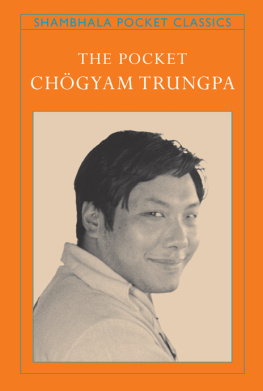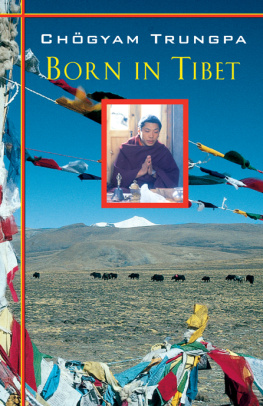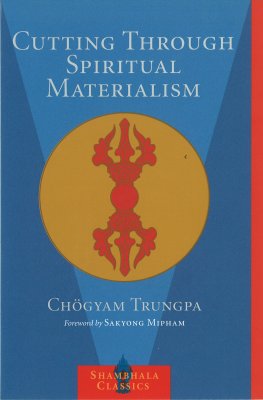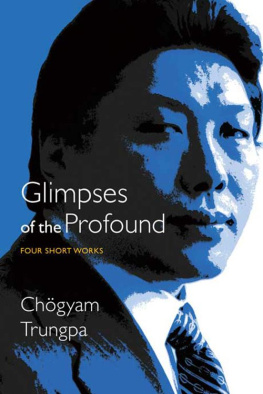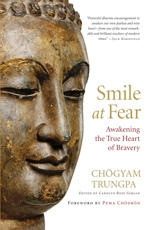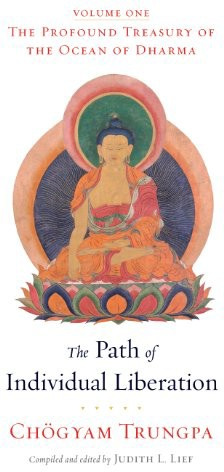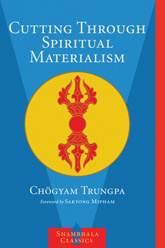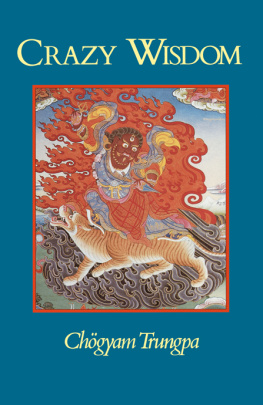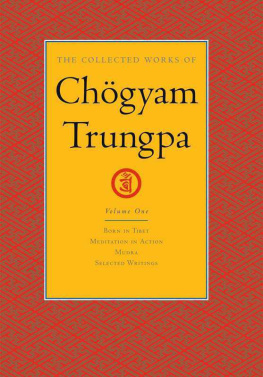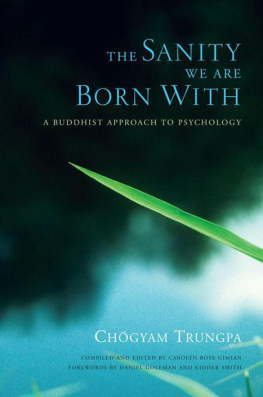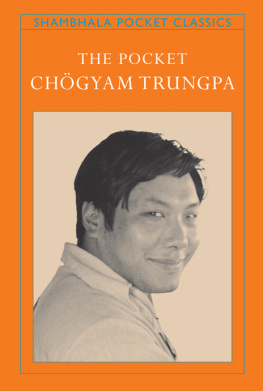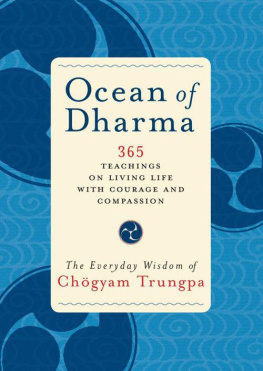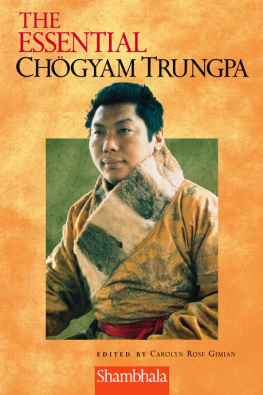ABOUT THE BOOK
Here is a treasury of 108 short teachings by Chgyam Trungpa, one of the most influential Buddhist teachers of our time. Pithy and immediate, these teachings address a range of topics, including fear and fearlessness, accepting our imperfections, developing confidence, helping others, appreciating our basic goodness, and everyday life as a spiritual path.
CHGYAM TRUNGPA (19401987)meditation master, teacher, and artistfounded Naropa University in Boulder, Colorado, the first Buddhist-inspired university in North America; the Shambhala Training program; and an international association of meditation centers known as Shambhala International. He is the author of numerous books including Shambhala: The Sacred Path of the Warrior, Cutting Through Spiritual Materialism, and The Myth of Freedom.
Sign up to receive inspirational quotes by Chgyam Trungpa and special offers from Shambhala Publications.

Or visit us online to sign up at shambhala.com/eoceanofdharma.
THE POCKET CHGYAM TRUNGPA
Compiled and Edited by
CAROLYN ROSE GIMIAN

SHAMBHALA
Boston & London
2010
Shambhala Publications, Inc.
Horticultural Hall
300 Massachusetts Avenue
Boston, MA 02115
www.shambhala.com
2008 by Diana J. Mukpo This book is an abridged edition of Ocean of Dharma, published by Shambhala Publications in 2008.
Cover photo: Photographer unknown, from the collection of the Shambhala Archives.
All rights reserved. No part of this book may be reproduced in any form or by any means, electronic or mechanical, including photocopying, recording, or by any information storage and retrieval system, without permission in writing from the publisher.
Library of Congress Cataloging-in-Publication Data
Trungpa, Chgyam, 19391987. The pocket Chgyam Trungpa / compiled and edited by Carolyn Rose Gimian.1st ed.
p. cm.
Abridged ed. of Ocean of dharma. Shambhala, 2008.
Includes bibliographical references.
eISBN 978-0-8348-2145-3
ISBN 978-1-59030-643-7
1. Trungpa, Chgyam, 19391987Quotations. 2. Spiritual lifeBuddhismQuotations, maxims, etc. I. Gimian, Carolyn Rose II. Trungpa, Chgyam, 19391987. Ocean of dharma. III. Title.
BQ990.R867A25 2008
294.3'4432dc22
2008015066
EDITORS INTRODUCTION
IT SEEMS as if everywhere we look these days we see violence and suffering. Though we might wish that things were different, fulfilling our desires for a more peaceful and happy life, in fact we must live in this world, not the world of our dreams. Full of speed, passion, anger, many defeats, and few victories, nevertheless, the world as it is gives us much to celebrate. The kindness and courage of human beings, the awesome beauty of nature, the spark of intelligence and goodness that will not be extinguishedwe also cannot deny these elements of life. And there is much to be done to help ourselves and to help this world, if we are willing. That is the essential message and the wisdom that permeates The Pocket Chgyam Trungpa.
This book of 108 short quotations is drawn from the writings of Chgyam Trungpa, the renowned Tibetan Buddhist teacher whose books transformed the understanding of Buddhism in the West. Virtually everyone now practicing the dharma in North America has been influenced, knowingly or not, by Chgyam Trungpa Rinpoche and his presentation of the Buddhist teachings. (Rinpoche is a title given to revered reincarnate lamas.)
Chgyam Trungpa had a passionate belief in the workability of our everyday lives. Life may present us with many problems, but he showed that it also offers us a genuine journey and many small wonders to appreciate. He taught that spirituality was not about becoming someone else but about becoming fully yourself and becoming completely engaged with your experience. He looked directly at many of the tough issues in life, such as aggression, fear, suffering, depression, and loneliness. In many of his teachings he also seemed to be looking ahead at what the challenges in the future might be. He spoke extensively about the interplay of fear and fearlessness, the need for a path of nonaggressive spiritual warriorship, and the dangers of spiritual and psychological materialismand he foresaw many of the thorniest problems that would face society as well as the individual.
Trungpa Rinpoches views were based not only on the ancient wisdom of his tradition but also on his own contemporary experience, his examination of life, and on his ability to predict how situations might evolve in the future. He appreciated paradox and the ironic contradictions of modern life. He thought that confusion and chaos were workable; in fact, viewed properly, they could be extremely good news.
Born and educated in Tibet, Trungpa Rinpoche saw his culture devastated by the communist Chinese invasion of 1959. Following his escape from Tibet, he studied at Oxford University and acquired a prodigious English vocabulary and uncanny understanding of Western culture and mind. He arrived in North America in 1970 and remained there until his death, teaching extensively and establishing many dharma centers and other institutions such as Naropa University and Shambhala Training.
He presented the buddhadharma in English, a savvy and sophisticated speaker of the language. (As one of his editors for more than thirty years, Ia native English speakerhave learned many new English words from him, encountered in his books and lectures.) The vocabulary that Chgyam Trungpa shaped for Buddhism in America has already entered the mainstream in a number of cases. His use of the word ego as a translation for the Sanskrit atman, is quoted in the Oxford English Dictionary, for instance. Unique phrases he coined like spiritual materialism, meditation-in-action, and crazy wisdom are now routinely used in Buddhist parlance.
The Pocket Chgyam Trungpa brings together quotations from his work that I hope will speak to a broad readership. I have searched for material that can be readily understood without an extensive background in Buddhist philosophy or practice. I would not claim to be finding the quotes that will become popular in the culture. There are so many possibilities; its hard to know which ones will prove to be the most compelling. Reading Trungpa Rinpoches work at a micro level, sentence by sentence or paragraph by paragraph, one sees his genius. The appeal is based on more than the craft of language. In just a few words, one senses a profound level of understanding and accomplishment, as well as concern for human welfare and indeed for all sentient beings, and one feels a deep reservoir of love and a sparkling humor that bursts out in unexpected ways.
Some of the quotes presented here deal with experiences that are inspired by or arise from the sitting practice of meditation, which is common to a great number of schools of Buddhism. Although details of the practice vary from one school to another, the similarities are such that I believe that the quotations in this volume apply universally. For those curious about meditation but untutored in the technique, an introduction to the practice of meditation is offered at the end of the book.
In one of his writings, Chgyam Trungpa says that anyone who creates a work of art has to meditate, whether they call the activity meditation or not. Wherever one finds a gap or a sense of space in life, whatever it is that one does that provides a feeling of ground, earth, or beingfundamentally, that is meditation. With that in mind, I think that almost anyone could connect with the material in this book.
Next page
